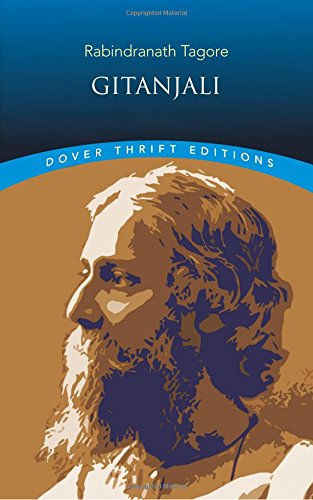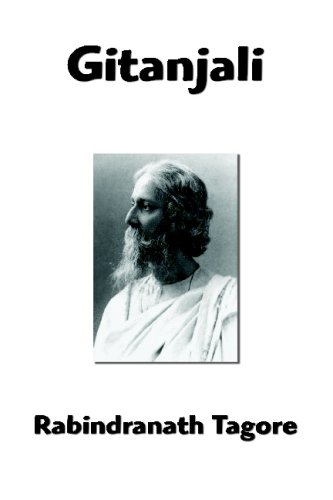-
Gitanjali
Rabindranath Tagore
language (, May 17, 2012)This book was converted from its physical edition to the digital format by a community of volunteers. You may find it for free on the web. Purchase of the Kindle edition includes wireless delivery.
-
Gitanjali
Rabindranath Tagore, Clay Lomakayu, Medicine of One
Audiobook (Medicine of One, Jan. 2, 2019)To hear one line of his is to forget all the troubles of the world. Rabindranath Tagore writes music for his words, and one understands at every moment that he is so abundant, so spontaneous, so daring his passion, so full of surprise, because he is doing something which has never seemed strange, unnatural, or in need of defense. At every moment the heart of this poet flows outward without derogation or condescension, for it knows that most will understand; and it has filled itself with the circumstances of life. This version has a new introduction by Swami Vivekananda on Bhakti or Devotion, the yoga of surrender.
-
Gitanjali
Rabindranath Tagore, W. B. Yeats
Paperback (Digireads.com Publishing, Dec. 27, 2019)First published in English in 1912, “Gitanjali”, or “Song Offerings”, is a collection of poems translated by the author, Rabindranath Tagore, from the original Bengali. It contains over 100 inspirational poems by India’s greatest poet and earned Tagore the Nobel Prize for Literature in 1913. Tagore, known as the “Bard of Bengal”, was born in 1861 to a wealthy family and started writing poetry as a child and began publishing critically acclaimed verses as a teenager. Tagore went on to write novels, stories, and dramas, work which would reshape Bengali literature and culture. He first published the “Gitanjali” collection of poems, widely considered to be one of his best works, in his native Bengali language in 1911. The original Bengali version contained over 150 verses and many were combined or edited out when Tagore translated them into English. Deeply spiritual and devotional, Tagore’s poems are primarily concerned with love and the conflict between earthly desires and spiritual passions and longings. Tagore also spoke eloquently and movingly of his connection to the natural world. This volume includes the introduction by William Butler Yeats that accompanied the original 1912 English language version. This edition is printed on premium acid-free paper.
-
Gitanjali
Rabindranath Tagore
Paperback (Dover Publications, Nov. 30, 2011)A Bengali poet and mystic, Rabindranath Tagore (1861–1941) had long been loved and admired in India, but it was not until the publication of his own English translation of more than a hundred of his Bengali poems in 1913 that he achieved international fame — and a Nobel Prize. Comprised of moving, heartfelt prose poems reminiscent of Blake and Gibran — many almost biblical in their rhythms, phrasings, and images — Gitanjali (Song Offerings) was inspired by medieval Indian lyrics of devotion in which the principal subject is love, through some poems detail the internal conflict between spiritual longings and earthly desires, and others depict images drawn from nature.In his introduction to this translation, William Butler Yeats writes: "I have carried the manuscript of these translations about with me for days and I have often had to close it lest some stranger would see how much it moved me." This new edition is sure to earn Tagore a broad new following.
-
Gitanjali
Rabindranath Tagore
Paperback (Independently published, Jan. 3, 2020)Gitanjali is a collection of poems by the Bengali poet Rabindranath Tagore. Tagore received the Nobel Prize for Literature, largely for the English translation, Song Offering. It is part of the UNESCO Collection of Representative Works. Its central theme is devotion & motto is 'I am here to sing thee songs '.
-
Gitanjali:
Rabindranath Tagore
language (JKL Classics, Jan. 1, 2018)"While traveling through one of the poorest regions in India, W. B. Yeats was amazed to discover the women in the tea fields singing the songs and poems of Rabindranath Tagore. This striking scene led the great Irish poet to appreciate the depth of India's far-reaching tradition of poetry and the fame of this one Indian poet. Tagore's work is without equal and
-
Gitanjali
Rabindranath Tagore
language (Penguin, May 6, 2011)Described by Rabindranath Tagore as ‘revelations of my true self’, the poems and songs of Gitanjali established the writer’s literary talent worldwide. They include eloquent sonnets such as the famous ‘Where the mind is without fear’, intense explorations of love, faith and nature (‘Light, oh where is the light?’) and tender evocations of childhood (‘When my play was with thee’).In this new translation to mark Tagore’s one-hundred-and-fiftieth birth anniversary, William Radice renders with beauty and precision the poetic rhythm and intensity of the Bengali originals. In his arrangement of Tagore’s original sequence of poems alongside his translations, Radice restores to Gitanjali the structure, style and conception that were hidden by W. B. Yeats’s edition of 1912, making this book a magnificent addition to the Tagore library.
-
Gitanjali
Rabindranath Tagore
Paperback (Fingerprint! Publishing, Oct. 1, 2017)BRAND NEW, Exactly same ISBN as listed, Please double check ISBN carefully before ordering.
-
Gitanjali
Rabindranath Tagore
language (, May 14, 2020)Gitanjali (Bengali: গীতাঞ্জলি, lit. ''Song offering'', IPA: [git̪ɑːnd͡ʒoli]) is a collection of poems by the Bengali poet Rabindranath Tagore. Tagore received the Nobel Prize for Literature, largely for the English translation, Song Offering. It is part of the UNESCO Collection of Representative Works.Original title:
-
Gitanjali
Rabindranath Tagore
Paperback (Filiquarian, Nov. 7, 2007)Gitanjali is an important collection of prose by Rabindranath Tagore, being a key Indian poet, author and of course Nobel Peace Prize winner. Individuals who are intestered in eastern poetry should embrace this book as it was written with eastern philosophy in mind. Tagore has long been known as an important author of works related to eastern philosophical beliefs, and has written an excellent collection of poetry which is featured in this publication.
-
GITANJALI: Annotated
RABINDRANATH TAGORE
language (, May 2, 2020)Included in this new edition :1. Biography of the Author Rabindranath Tagore2. Active table of contents3. Complete original content without any changesGitanjali: Rabindranath Tagore is an English translation of various poems and works of the legendary Indian poet Shri Rabindranath Tagore. Translated by Tagore himself, the book contains fifty-three translated poems from the original Bengali version of Gitanjali: Rabindranath Tagore, as well as fifty other poems from eight of his other works on poetry and a drama titled Achalayatan.An integration of two words, 'Git' and 'Anjali,' meaning song and offering respectively, the literal meaning of the word is 'offering of songs.' and because of the strong devotional tone and subliminal spiritual incitation, the book can be said to have devotion to god as its theme. It highlights the poet's intense response to the magnificence of the universe or rather an affirmation of life with all its abundance, mystery and diversity.
-
GITANJALI
RABINDRANATH TAGORE
Paperback (Independently published, Aug. 25, 2018)A few days ago I said to a distinguished Bengali doctor of medicine, `I know no German, yet if a translation of a German poet had moved me, I would go to the British Museum and find books in English that would tell me something of his life, and of the history of his thought. But though these prose translations from Rabindranath Tagore have stirred my blood as nothing has for years, I shall not know anything of his life, and of the movements of thought that have made them possible, if some Indian traveller will not tell me.' It seemed to him natural that I should be moved, for he said, `I read Rabindranath every day, to read one line of his is to forget all the troubles of the world.' I said, `An Englishman living in London in the reign of Richard the Second had he been shown translations from Petrarch or from Dante, would have found no books to answer his questions, but would have questioned some Florentine banker or Lombard merchant as I question you. For all I know, so abundant and simple is this poetry, the new renaissance has been born in your country and I shall never know of it except by hearsay.' He answered, `We have other poets, but none that are his equal; we call this the epoch of Rabindranath. No poet seems to me as famous in Europe as he is among us. He is as great in music as in poetry, and his songs are sung from the west of India into Burma wherever Bengali is spoken. He was already famous at nineteen when he wrote his first novel; and plays when he was but little older, are still played in Calcutta. I so much admire the completeness of his life; when he was very young he wrote much of natural objects, he would sit all day in his garden; from his twenty-fifth year or so to his thirty-fifth perhaps, when he had a great sorrow, he wrote the most beautiful love poetry in our language'; and then he said with deep emotion, `words can never express what I owed at seventeen to his love poetry. After that his art grew deeper, it became religious and philosophical; all the inspiration of mankind are in his hymns. He is the first among our saints who has not refused to live, but has spoken out of Life itself, and that is why we give him our love.' I may have changed his well-chosen words in my memory but not his thought. `A little while ago he was to read divine service in one of our churches---we of the Brahma Samaj use your word `church' in English---it was the largest in Calcutta and not only was it crowded, but the streets were all but impassable because of the people.'